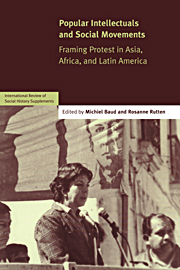Book contents
- Frontmatter
- Contents
- List of Contributors
- Introduction
- Framing, Transnational Diffusion, and African-American Intellectuals in the Land of Gandhi
- Indigenous Communists and Urban Intellectuals in Cayambe, Ecuador (1926–1944)
- Reforming Mysticism: Sindhi Separatist Intellectuals in Pakistan
- Unemployed Intellectuals in the Sahara: The Teshumara Nationalist Movement and the Revolutions in Tuareg Society
- Between Sovereignty and Culture: Who is an Indigenous Intellectual in Colombia?
- Critics and Experts, Activists and Academics: Intellectuals in the Fight for Social and Ecological Justice in the Narmada Valley, India
- Framing Jihad: Intramovement Framing Contests and al-Qaeda's Struggle for Sacred Authority
- Popular Publics: Street Protest and Plaza Preachers in Caracas
- Concluding Remarks: Framing Protest in Asia, Africa, and Latin America
Framing Jihad: Intramovement Framing Contests and al-Qaeda's Struggle for Sacred Authority
Published online by Cambridge University Press: 04 August 2010
- Frontmatter
- Contents
- List of Contributors
- Introduction
- Framing, Transnational Diffusion, and African-American Intellectuals in the Land of Gandhi
- Indigenous Communists and Urban Intellectuals in Cayambe, Ecuador (1926–1944)
- Reforming Mysticism: Sindhi Separatist Intellectuals in Pakistan
- Unemployed Intellectuals in the Sahara: The Teshumara Nationalist Movement and the Revolutions in Tuareg Society
- Between Sovereignty and Culture: Who is an Indigenous Intellectual in Colombia?
- Critics and Experts, Activists and Academics: Intellectuals in the Fight for Social and Ecological Justice in the Narmada Valley, India
- Framing Jihad: Intramovement Framing Contests and al-Qaeda's Struggle for Sacred Authority
- Popular Publics: Street Protest and Plaza Preachers in Caracas
- Concluding Remarks: Framing Protest in Asia, Africa, and Latin America
Summary
Summary: This article emphasizes the credibility of popular intellectuals as a point of contention in framing contests. A movement group – a faction, clique, submovement, network cluster, organization, etc. – asserts its authority to speak on behalf of an issue or constituency by emphasizing the perceived knowledge, character, and logic of its popular intellectuals while attacking those of rivals. Four basic framing strategies relevant to the credibility of popular intellectuals are identified: (1) vilification – demonizing competing popular intellectuals; (2) exaltation – praising ingroup popular intellectuals; (3) credentialing – emphasizing the expertise of the ingroup intellectuals; and (4) decredentialing – raising questions about the expertise of rivals. Al-Qaeda's intramovement framing struggle with nonviolent Islamic fundamentalists over the permissibility of violence is used as a case study. In an attempt to assert its right to sacred authority, the movement portrays scholars who support its jihad as logical, religious experts of good repute while characterizing opposing clerical popular intellectuals as emotional, corrupt, naive, and ill-informed about politics.
Over the past several decades, a dense ideological network of Islamic fundamentalists known as salafis has expanded dramatically to become one of the largest Islamist movements in the Muslim World. The term, salafi, is derived from the Arabic salaf, which means “to precede”, and refers to the companions of the Prophet Mohammed. Because the salaf learned about Islam directly from the messenger of God, their example is an important illustration of piety and unadulterated religious practice.
- Type
- Chapter
- Information
- Popular Intellectuals and Social MovementsFraming Protest in Asia, Africa, and Latin America, pp. 159 - 178Publisher: Cambridge University PressPrint publication year: 2005

